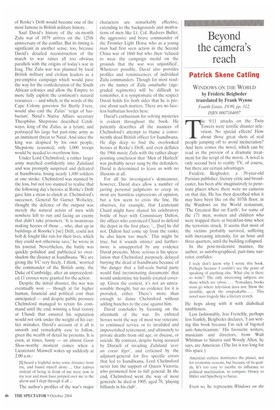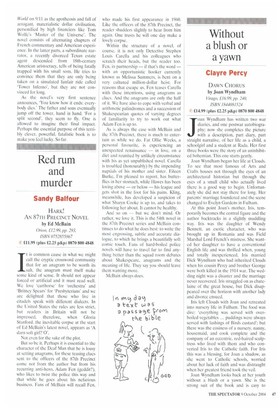Beyond the camera's reach
Patrick Skene Catling
WINDOWS ON THE WORLD by Frederic Beigbeder translated by Frank Wynne Fourth Estate, .19.99, pp. 312, ISBN 0007184697 The 9/11 attacks on the Twin Towers were terrific disaster television. No special effects! How about those great shots of real people jumping off to avoid incineration? And here comes the novel, which can be read as the preview of a dramatic treatment for the script of the movie. A novel is only second best to reality TV, of course, but there are certain advantages.
Frederic Beigbeder, a 39-year-old Parisian publisher, literary critic and broadcaster, has been able imaginatively to penetrate places where there were no cameras on that day. He has then described what it may have been like on the 107th floor, in the Windows on the World restaurant, 'The Greatest Bar on Earth', for some of the 171 men, women and children who were trapped there at breakfast-time when the terrorists struck. It seems that most of the victims probably survived, suffering with increasing intensity, for an hour and three quarters, until the building collapsed.
In the post-modernist manner, the author, as autobiographical, part-time narrator, confides:
I truly don't know why I wrote this book. Perhaps because I couldn't see the point of speaking of anything else. What else is there to write? The only interesting subjects are those which are taboo.... Nowadays, books must go where television does not. Show the invisible, speak the unspeakable.... This novel uses tragedy like a literary crutch.
He hops along with it with diabolical nimbleness.
Less fashionably, less Frenchly, perhaps less frankly, Beigbeder declares, 'I am writing this book because I'm sick of bigoted anti-Americanism,' His favourite writers, musicians and directors, from Walt Whitman to Sinatra and Woody Allen, he says, are American. (The list is too long for this space.)
American culture dominates the planet, not for economic reasons, but because of its quality. It's too easy to ascribe its influence to political machination, to compare Disney to Hitler and Spielberg to Satan.
Even so, he represents Windows on the
World on 9/11 as the apotheosis and fall of arrogant, materialistic dollar civilisation, personified by high financiers like Tom Wolfe's 'Master of the Universe'. The novel consists of alternating chapters of French commentary and American experience. In the latter parts, a subordinate narrator, a recently divorced Texan estate agent descended from 18th-century American aristocracy, tells of being fatally trapped with his small sons. He tries to convince them that they are only being taken on a simulated funfair ride called 'Tower Inferno', but they are not convinced for long.
As the novel's very first sentence announces, 'You know how it ends: everybody dies.' The father and sons eventually jump off the tower, hand in hand. 'For a split second', they seem to fly. One is allowed to imagine their final impact. Perhaps the essential purpose of this terribly clever, powerful, fatalistic book is to make you feel lucky. So far.



















































































































 Previous page
Previous page